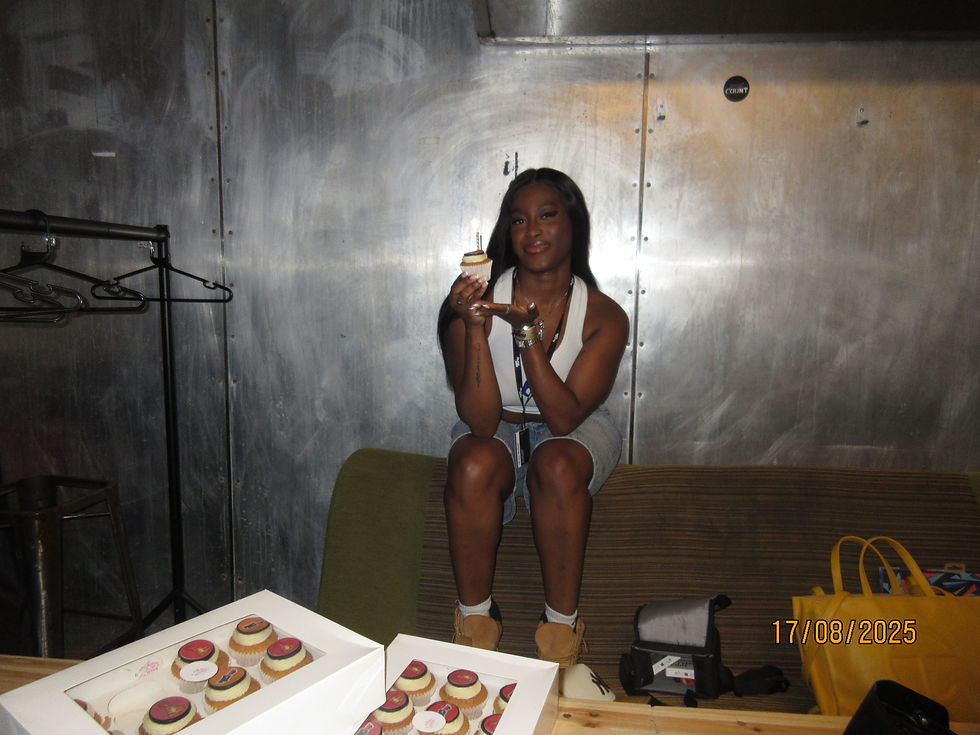Meet Mayowa: It's 'Just A Party' Redefining Black Nightlife in London [Interview]
- Zhakiya Sowah
- Sep 18
- 4 min read
On an August night in 2024 at the Colour Factory, Mayowa rewrote the script for Black nightlife in London. Her event, Just A Party, had no VIPs, no guestlist, and no tables. No velvet ropes or bottle wars. In their place: a DJ booth and a dancefloor free from spectacle encourage the crowd to “shake a leg” without any limitation. A year on, the founder has built a community that comes together for exactly what it says on the tin, Just A Party.

“I wrote in my notes before it had a name: I really want to remove exclusivity and desirability from Black nightlife,” she tells me. “That’s still the only thing at the centre of it.”
The idea was born during her last year at university. With friends lamenting that London offered little that was fun, affordable, and unpretentious “Everyone was saying, ‘I don’t want to wear heels. I don’t want to buy a table.’” Recess had just announced they were ending their small, intimate parties for bigger events and Mayowa sensed a gap. What began as a set of notes on her phone from 2022 became Just A Party. with a gunfingers logo and a no-frills approach to clubbing.
That refusal runs deeper than branding. Mayowa speaks about her three rules: no VIPs, no guestlist, no tables as a form of care. “I think as a Black woman specifically, I don’t like the idea of anybody walking into a space where they feel judged or at risk. Venue searches, transport, staffing, I take it all very seriously,” she says. “People should be able to have a good time no matter what they’re wearing or whether they’re on someone’s table.”
It’s a subtle but pointed critique of the scene she grew up in. In a nightlife culture where image and access can eclipse the actual night out, Just A Party prioritises the crowd’s collective energy. This philosophy shows in how DJs describe her audiences as the freest they’ve played for. “I cater to strangers more than I do to my friends,” she explains. “It’s not Mayowa’s party. It’s just a party.”

Running an event on those principles has meant operating outside the boys’ club that dominates London’s event economy. “I do this alone. A lot of event teams are three or four men. By default that gives you more reach and credibility,” she says. “People are sceptical like, can girls really throw parties like that? Men want another man to validate that the party’s worth going to.”
It’s interesting to note that while many event companies and owners talk at length about curating the atmosphere to appeal to women, that insight rarely translates into support for female ownership in the events space. Women are recognised as the ones who set the pace at parties, from the music to vibe and energy, yet they’re often excluded from positions of power where those very environments are orchestrated. The contradiction highlights how influence in nightlife is gendered. Women drive the culture on the dance floor, but men largely control the boards behind it.
Her frustration is not just personal. Mayowa’s response is to build the ecosystem she wants to see. Every Just A Party lineup features at least one DJ she hasn’t booked before and at least a 50% female lineup. “There’s no excuse for having a DJ roster with no women,” she says flatly. “It’s not about diversity optics; it’s about looking for good talent. If you have the ability to do something, do it.”

Her insistence on welfare and safeguarding is equally rare. She recounts a summer incident at Peckham Arches when a man tried to fight her door staff over a late fee. “I came over and said, we don’t talk to my door staff like this. He asked who I was. I said, ‘I own this event.’ He didn’t believe me.” When the man later crossed a line with another attendee, she had him removed immediately. “I don’t think we see enough of that. Welfare is an afterthought in events. People don’t have proper processes in place. You have to care enough about your crowd to be active.”
Women who run events often face skepticism about their competence, with their authority questioned in ways male organisers rarely experience. By taking the welfare of her attendees seriously, she challenges these gendered assumptions while showing how leadership grounded in care can reshape event culture. In a scene where women’s presence is celebrated on the floor but seldom in decision-making, her approach links thoughtful stewardship with broader diversity at the top. Mayowa demonstrates that creating safe, vibrant spaces relies as much on representation as it does on responsibility.





![Meet Kendrafilmz: Feeling in Black British Visual Culture [INTERVIEW]](https://static.wixstatic.com/media/1779fb_71c64c1471e04a5a99e21d4b38f196ee~mv2.jpg/v1/fill/w_980,h_1427,al_c,q_85,usm_0.66_1.00_0.01,enc_avif,quality_auto/1779fb_71c64c1471e04a5a99e21d4b38f196ee~mv2.jpg)


I love this so much! It’s such a breath of fresh air to have an event that actually cares about its audience and is all about safety! ‘Just a Party’ you will always be famous!!! <3